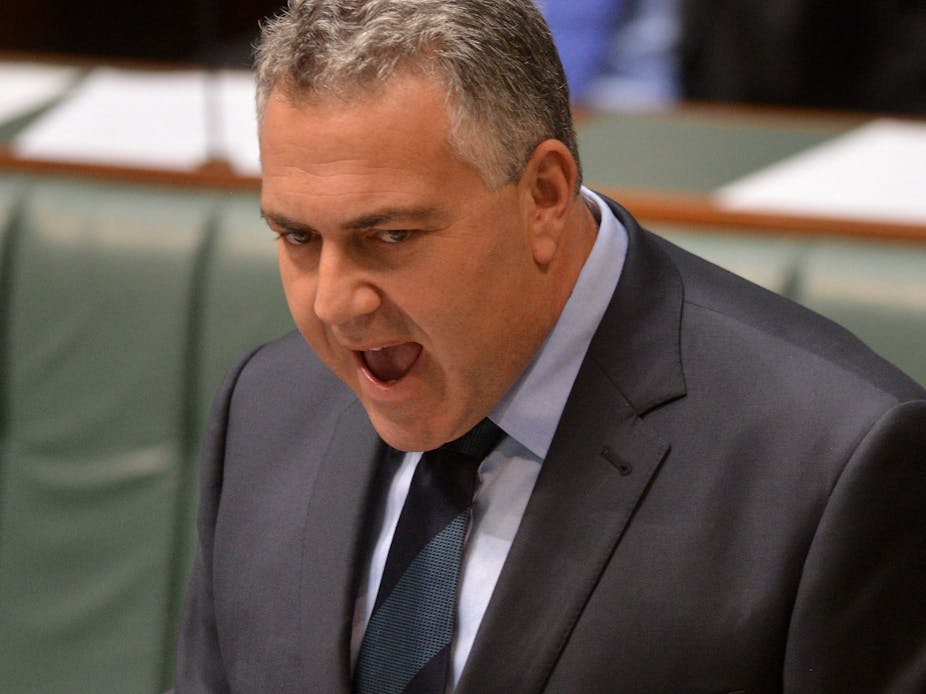The Abbott government, when faced with opposition over the past year, has commonly resorted to two lifeline statements. The first is that it’s carrying out the “will of the people”. And the second is that “the people have spoken”. These are words taken from the vocabularies of demagogues, not democrats.
Frontbenchers like Joe Hockey, Tony Abbott, Malcolm Turnbull and Greg Hunt use these phrases to delegitimise their opponents both within parliament and more broadly. In effect, they’re saying if you disagree with government policy you are at odds with the “will of the people”. This is a serious claim.
Turnbull, for example, claimed the mandate to govern in 2013 when facing opposition over changes to the National Broadband Network (NBN). Last March, Hunt argued that the Senate was blocking the will of the people by not passing the carbon tax repeal. Hockey and Abbott have repeatedly claimed the same in reference to the Senate blocking tax repeals.
How did ‘the people’ vote?
The problem when politicians do this is that they are claiming untruths. Let’s look at some 2013 election data to partly justify our claim that at best the government can only claim to be representing the “will of a minority”.
According to the Australian Bureau of Statistics, the population of Australia was over 23.2 million at the time of the 2013 national election. Of that 23.2 million, 14.7 million were registered to vote. And of that 14.7 million, the Liberals in their own right picked up 4.1 million first-preference votes (the Liberals gained 2.8 million votes in support through the other Coalition parties and also through the transferable vote).

In sum, the Abbott-led government can at most claim to be representing the will of about 6.9 million Australians out of 23.4 million. But, if we look at the composition of the cabinet (these ministers are typically the “decision-makers” or executives), 16 come from the Liberals, two from the Nationals and one from the Country Liberals. This means that the cabinet is essentially making decisions as representatives of fewer than 5.9 million Australians.
That’s about 25% of Australians or 40% of enrolled voters. The government thus cannot logically make a claim to be carrying out the “will of the people”. It’s not even carrying out the will of a majority of voters.
The most the government can say is that it is carrying out what it presumes to be the will of a substantial minority. We say presume because how many of the 5.9 million voters who gave their first-preference vote to Coalition parties fully understood and endorsed everything they were voting for? And how many have since changed their minds on policies the Abbott government revealed only after the election?
Reform needed to express democratic will
If the government is serious about acting on the “will of the people”, as dubious as that ambition might be, then reforming Australia’s electoral system should be on the agenda. The reason for this is it’s because of the voting system we have that 25% of Australians were empowered to bring to bear a majority government. This problem doesn’t exist in New Zealand and Germany, which use a mixed member proportional representation system, which Australians should consider adopting.
But in focusing on these numbers we’ve skirted the main flaw in the government’s heavy-hitting lines. The objection comes in part from political philosophy and in part from electoral studies.
Political philosophers have a long history of debating whether the will of the people can be determined or whether we can ever know if the people have spoken. Popular references to “the people” and their will tend to be oversimplified. More often than not, it’s used as a political weapon to shut down debate.
Who are the people? Is it enough to “speak” once every three or four or five years (depending on the nation or state in question) - or even six years in the case of individual senators - until the next election is held?
The field of electoral studies makes a more concrete point. Elections are heavily mediated and controlled procedures - there is actually very little “speaking” going on by “the people” when citizens vote.
Voters that successfully vote are already by definition a small majority of Australians. The government, and indeed Australians, have to confront the fact that democracy means more than 14.7 million people being allowed to vote every once in a while.
Voters participate in a system that determines, numerically, which representative will win what seat. This shows who the people will be working with over the coming government’s term. The substance of democracy comes after the election.
Democracy is not a winner-takes-all scenario where those who win the election become the rulers with a sacred mandate to govern as they see fit. Democracy is an ongoing process of deliberation, monitoring, inclusion and resistance. To work properly, it requires voters and their representatives to work together to achieve the most palatable ends for Australians.
“The will of the people” and “the people have spoken” are false constructions that are used to delegitimise opponents and shut down debate. It’s a bastardisation of democracy.

